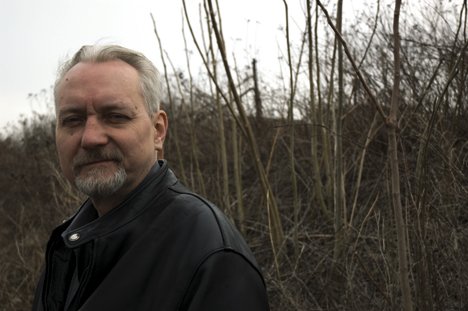
AGOKWE written and performed by Waawaate Fobister, directed by Ed Roy (Buddies in Bad Times, 12 Alexander). Previews begin Tuesday (September 23), opens September 25 and runs to October 12, Tuesday to Saturday 8 pm, Sunday 2:30 pm. Pwyc-?$29. 416-?975-?8555.
Waawaate Fobister won’t forget the moment in high school when he locked eyes with another guy and saw the same sexual interest in the other teen.
[rssbreak]
“Smitten” is the word that native writer/performer Fobister uses to describe his feelings. No surprise that the episode inspires his solo show Agokwe, which kicks off the season at Buddies in Bad Times.
The title, which translates as “two-spirited,” sums up the Aboriginal concept of queerness as a person having both male and female aspects in balance. Before the intervention of white culture, the agokwe figure had a spiritual authority that could override that of a chief.
“This story is important for me since I know first-hand that homophobia exists in native communities,” says Fobister, an Ojibwa from Grassy Narrows First Nation in northwestern Ontario. “The respect once offered to agokwe has been lost because of assimilation.”
Fobister’s coming-out play, which draws on the performer’s background as a powwow grass dancer, involves not only the two teen guys – one a dancer and the other a budding hockey star – but also female relatives and, serving as narrator and sometime participant in the action, the trickster Nanabush.
“I heard stories growing up that Nanabush can do anything as a deceiver and shape-shifter,” smiles Fobister. “To this day, when I trip in our apartment, my roommate says that Nanabush did it.”
“The play’s Nanabush allows us to draw parallels between the macrocosm and the microcosm,” adds dramaturge and director Ed Roy. “The suggestion is that if you fix the individual, the planet will also be happy and healthy.”
Roy took on the project at the suggestion of Buddies artistic director David Oiye and Evalyn Parry, who nurtured Fobister’s story through Buddies’ youth program from a monologue at QueerCab’s open mic through PrideCab and the young creators’ unit.
In the process, Fobister learned that it’s not only tricky to write a solo show but also to play all six characters. Part of the challenge, says Fobister, is finding the stamina to perform a piece that is as much choreography as text.
But there’s also the importance of defining the various figures.
“I have to constantly change my voice, body and mindset as I move from one person to another,” he says.
“The hardest for me is Mike, the jock, because he’s the most different from who I am. It’s been a challenge to take a person who really existed and make him fictional.”
From the director’s viewpoint, Fobister is closer to Jake, the play’s narrative centre, but Roy admits that Mike would be a difficult character for any actor to present.
“Mike is the repressed young man who’s entrenched in the masculine,” he explains. “He’s less articulate and less aware of his feelings than Jake. He rests in a clogged emotional state. Building a blocked character is hard for any performer.”
Roy worked with Fobister long before Buddies he taught him in Fobister’s second year at Humber College, where the young actor performed Shakespeare and Chekhov.
“I thought his written voice was unique then, and when I read the script for Agokwe, I realized I’d never heard the coming-out experience of a young Aboriginal man,” recalls Roy.
“An urban, sophisticated audience thinks that it’s heard every coming-out story, and many of them think that living an openly gay life is easy.
“But the situation in rural areas is really different for many young gays and lesbians theirs is also an important tale to tell.”
Though Fobister considers himself an activist and understands the political side of Agokwe, once he’s onstage his focus is on creating theatre.
“I’m used to ensemble work, but here I can rely only on myself. I’m living and sleeping with the play’s six characters every day because what I have to do is tell their story. That’s the most important thing about theatre – to tell the story in an efficient and entertaining fashion.”
jonkap@nowtoronto.com













